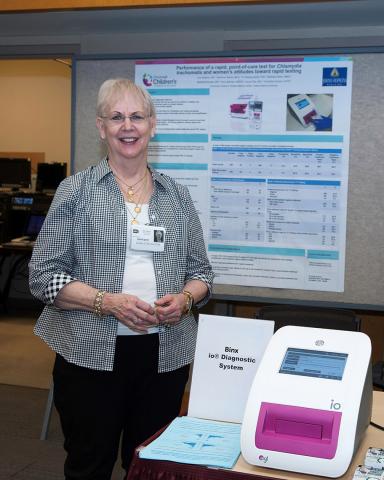NIBIB Grantee’s Diagnostic for STDs Is Cleared by FDA

Photo: NIBIB
A point-of-care system to test for chlamydia and gonorrhea infection in just 30 minutes has been cleared for marketing by the Food and Drug Administration. The technology, developed by Binx Health, with locations in Boston and the U.K., is the result of funding from the National Institute of Biomedical Imaging and Bioengineering through its Point-of-Care Technologies Research Network (POCTRN).
Since 2007, the network has supported multiple centers whose purpose is to drive the development of appropriate point-of-care diagnostic technologies through collaborative efforts that merge scientific and technological capabilities with clinical need.
In this case, Binx was supported by long-time NIBIB grantee Dr. Charlotte Gaydos, head of the Center for Point-of-Care Technologies Research for Sexually Transmitted Diseases (STDs). She established the center at Johns Hopkins University, where the program has pioneered the development of rapid, mobile, inexpensive diagnostic platforms for STDs. The center has supported three early development projects for rapid molecular STD testing every year since 2007 and is in the early stages of its third 5-year cycle.
“Dr. Gaydos is known internationally for her multi-pronged approach to creating successful STD diagnostics,” said Dr. Tiffani Lash, NIBIB program director for POCTRN. “She recognizes what it takes to develop a pragmatic, useful diagnostic. Her approach includes both technology development and listening carefully to potential users about what type of procedure and setting is needed to increase the likelihood that individuals will be comfortable using the STD test.”
The Binx system is fast because it is a molecular diagnostic test that detects RNA or DNA of the pathogen of interest. Gaydos explains why getting the test down to 30 minutes is critical: “We have found that patients are willing to wait 30 minutes, but not longer, to get their results. They then can be treated immediately. Also, if patients leave their samples and come back in a couple of days to get their results, they may have infected partners before they have begun treatment and the STD will continue to spread.”
Another important aspect of a 30-minute test is that health professionals can use the time to council patients on STD prevention in the future and explore how to talk to a partner about getting tested and treated.
“It is the attention to these sorts of details with patients that makes Dr. Gaydos so successful at developing complete programs to reduce STD spread at the population level,” said Lash.
POCTRN currently has five centers across the country—several with international partners. Since its inception in 2007, POCTRN has grown its partnerships with industry and other stakeholders to facilitate the needs assessment, technology evaluation and clinical testing necessary to realize clinical impact of new point-of-care technologies and enable new approaches to health care delivery.
Though led by NIBIB, POCTRN gets additional support from the National Heart, Lung, and Blood Institute, the National Institute of Allergy and Infectious Diseases, the National Center for Complementary and Integrative Health, the Fogarty International Center, the Office of Behavioral and Social Sciences Research, the Office of AIDS Research and the Office of Disease Prevention.
